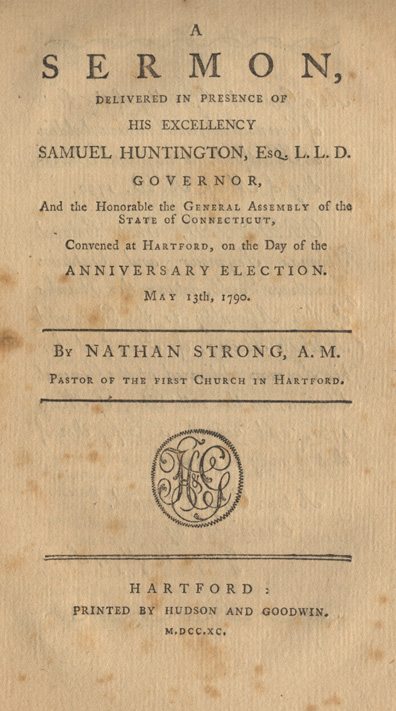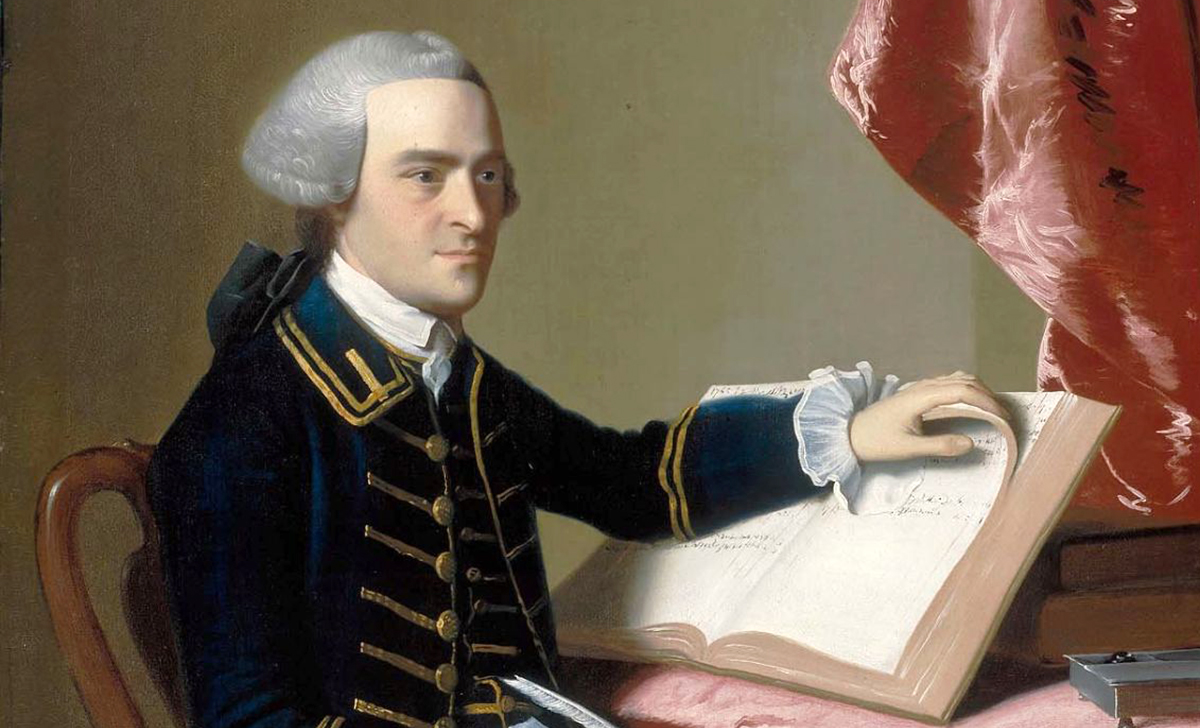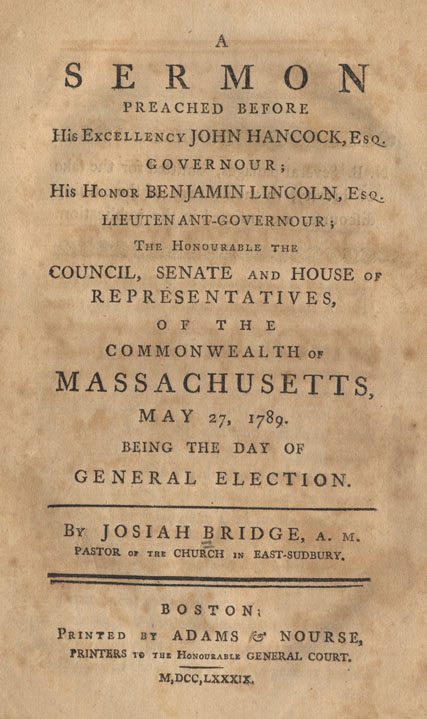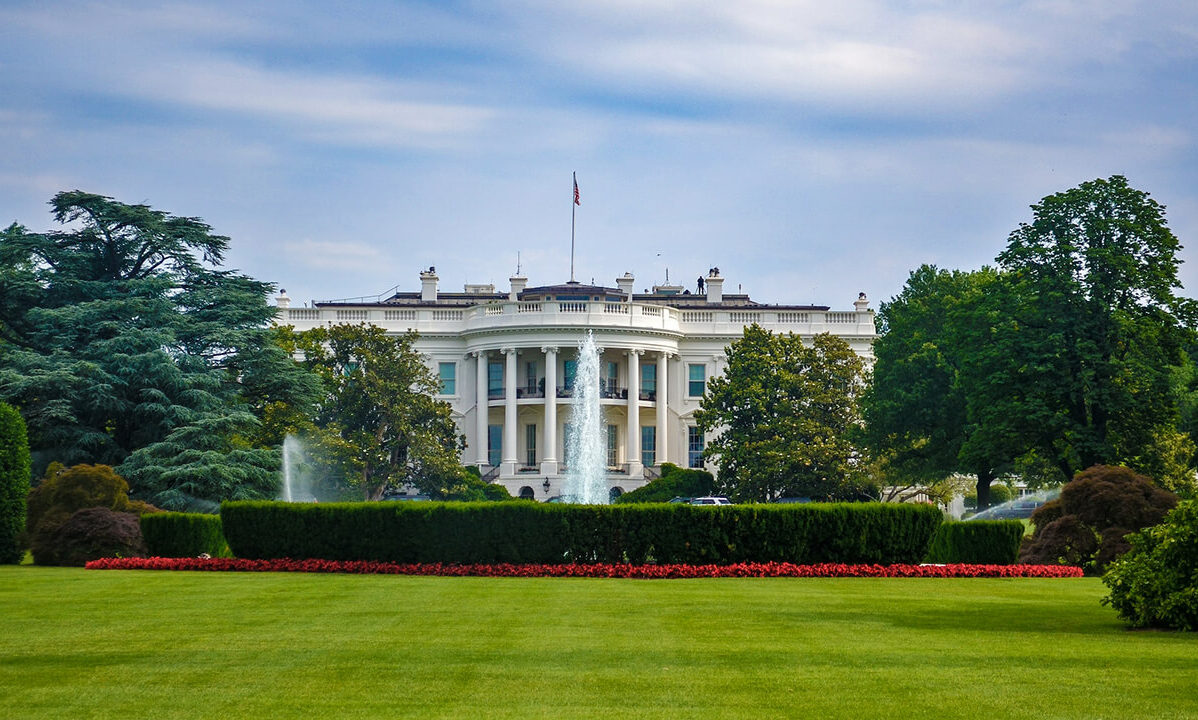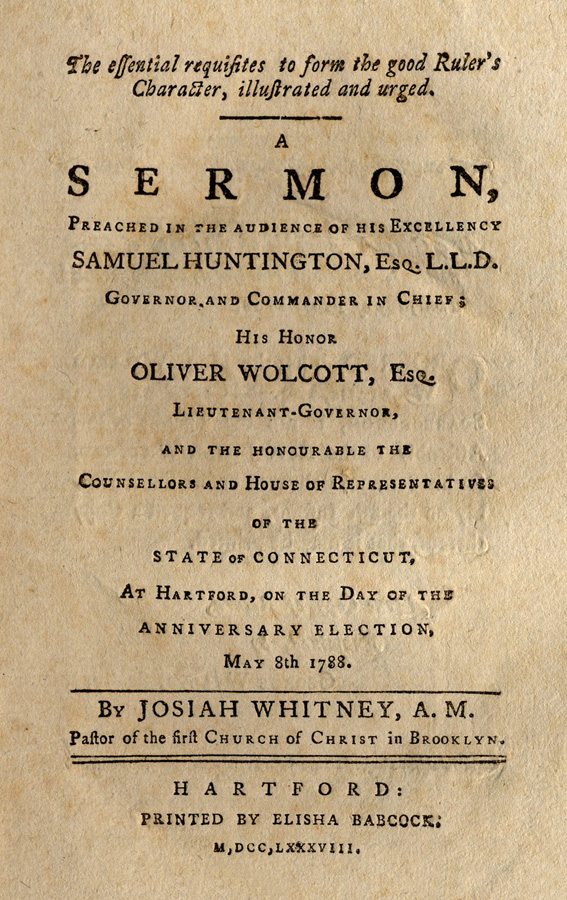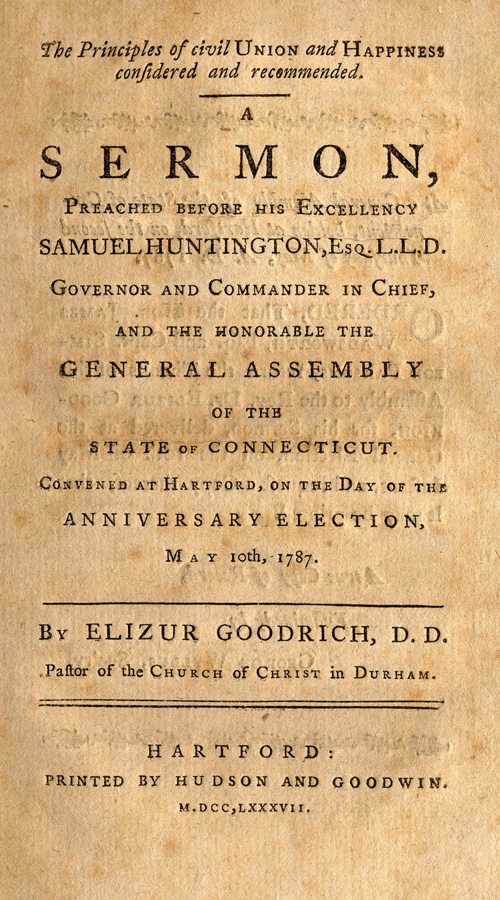Chandler Robbins was born in Branford, Connecticut in 1738, and he graduated from Yale in 1756. He studied theology and was ordained pastor of the Congregational church in Plymouth, Massachusetts.
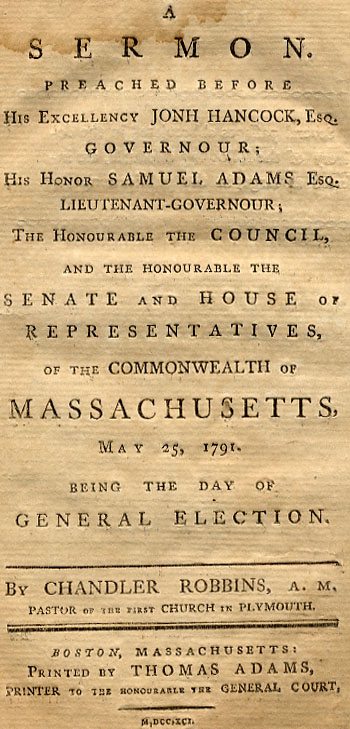
A
sermon
Preached Before
His Excellency John
Hancock, Esq.
Governor;
His Honor Samuel
Adams Esq.
Lieutenant-Governor;
The Honorable The Council,
And The Honorable The
Senate And
House Of
Representatives,
Of The Commonwealth
Of
Massachusetts,
May 25, 1791.
Being The Day Of
General Election.
By Chandler Robbins,
Pastor of the First Church in Plymouth.
II. Chronicles, Chap. XII. Verse XII. Last Clause.
-And also in Judah things went well.
A Short, but a very striking description of the prosperous state of a community. May it ever characterize the growing Empire of this Western World- and, till time shall be no more, may “things go well” with United America!
The passage now read, alludes to the then peaceful and happy state of the kingdom of Judah. Judah, though once united with Israel, was now become a separate and independent people. Under the reign of some former Kings, they had enjoyed great prosperity- they were highly distinguished by the blessings of Heaven, and had long lived together in harmony and friendship. But, by an unhappy stroke of policy, and by certain arbitrary claims in the reigning Prince, instigated by evil counselors, such a convulsion was produced in the nation, as, in the end, dismembered the empire; and Israel and Judah became distinct governments, and were never afterwards united again.
It seemed a mysterious event in providence, at first; but we do not find, in the succeeding history of that people, that Judah had any particular cause to regret the separation, on account of any special calamities that befell them in consequence of it. On the contrary, it appears, that God was pleased, for his servant David’s sake, whom he loved, to make the kingdom of Judah the object of his peculiar care. They had, at different periods, Kings of eminent character, at the head of their government- renowned for piety and wisdom; under whose administration, the people of Judah enjoyed great quietness. When they were of a different character, and “did evil in the sight of the Lord,” he often testified his displeasure against them, by “terrible things in righteousness”- not unfrequently, by letting loose a barbarous, heathen enemy upon them, and they were brought into great distress.
This seems to have been the case with Judah, just before the happy Era, mentioned in the text. But when, in their trouble, they sought the Lord, and appeared to repent and humble themselves before him, God, rich in mercy, and who “never afflicts willingly,” turned from the fierceness of his anger, scattered the threatening storm, and again restored tranquility to their land. And now it is said of them, “in Judah things went well.” Their government was peaceful and happy- the smiles of Heaven attended their affairs, and there was no special cause for sorrow or complaint.
A concurrence of similar circumstances, must render any people happy. More happy still, if, in the enjoyment of these favors, they make suitable returns, to the author of all good, and are thankful.
The words, it is presumed, are a proper ground for some observations, suited to the present occasion. The method proposed, is,
I. To consider, more generally, the import of the phrase in the text, as applied to a civil community- or to enquire, when may things be said to go well in a State?
II. Shew, more particularly, what are necessary, as means, to constitute this prosperous state of community. Which will naturally lead us, by way of application, to confider the obligations such a people are under to a grateful sense, and a wise improvement of the divine favors.
I. To consider, more generally, the import of the expression in the text- or when do things go well with a civil community?
From the known analogy between the political and the human body, we may find a natural illustration of the phrase in the text.- This expression, when applied to the political, seems to import the same as health in the natural body.- The most happy and perfect state of the human body, results from the due order of its various members and parts, each performing regularly, the several offices assigned them by the great Creator. When this is the case, we say of a person, he is well- or, in other words, he enjoys health.
So in collective bodies, or societies- as they are composed of various orders and individuals, each connected with, and subservient to the other; the health and prosperity of the whole, is then only maintained, when the several parts and members of the body politic preserve their proper places, and regularly and faithfully perform the duties of their various stations.- When this takes place, “things go well with them”- they are in a state of political health.- These things, at least, constitute the internal welfare of a community, and the condition of such a people, must be really happy, provided they are not disturbed by enemies abroad, and are virtuous at home.
The political, as well as the natural body are liable to injury, from both these causes. And they may operate so powerfully, if unrestrained, as to prove fatal to both.
In order therefore, that a people may enjoy that prosperity in the fullest sense, which is intended in the text, it is necessary, not only, that internal order be preserved in the state, and the members of it be at peace among themselves, but that they be undisturbed by external force, and be permitted to “sit under their vine and fig tree, and have none to make them afraid.”
In a word, it goes well with a State, when they enjoy the blessing of a good government, wisely administered- when no foreign invasion disturbs their peace-no internal sedition interrupts their harmony- especially, when, in addition to this, benevolence and virtue reign among them- when the fear of God rules in their hearts, and Love to men, influences their conduct- when they practice sobriety- temperance- industry, and all the social virtues, and “lead quiet and peaceable lives in all godliness and honesty.”- Under these happy circumstances, who, but must acknowledge, “things go well” with such a community.
But this naturally leads us, in the Second place-
II. To point out, more particularly, what are necessary as means, to promote that happy state of society, mentioned in the text.- This important question may, perhaps, be elucidated, by a little further attention to the similitude before adduced.
What do we conceive necessary to constitute full health and vigor in the human frame? And, by what means, may an individual be rendered capable of enjoying life and the blessings of it?- To this, doubtless, it must be answered,
1st. That a good Constitution is of principle importance. Where this is wanting, a person can never enjoy high health- There is a radical obstruction to it- an original defect; which can never be fully supplied, by the greatest regularity and care.
Of equal importance to the health of a community, is a good civil Constitution or frame of government. This is the foundation on which political life and happiness are raised and secured. A defect here, will be attended with lasting ill consequences to the State- consequences, which will be felt through every part of the system- if not by convulsions and violent disorders, which threaten the life of the body, yet, by growing debility and languor, and such a want of energy, as will forever prevent the enjoyment of any great degree of happiness.
With respect to civil constitutions, mankind, it is true, have entertained different ideas; in consequence of which, the forms adopted, have been various; according to the different habits, genius and circumstances of the people. Some have been pleased with a monarchical form- others have chosen an aristocratical- while others have given the preference to a more popular mode of government.
Government, however, in some form, mankind have, in all ages, found absolutely necessary for their security and happiness. This seems to be a sufficient proof, if there were none more express, that civil government is of divine ordination the necessity of it, for the order and happiness of the world.
“The proper knowledge of mankind, is man.” And, however humiliating the thought, yet those who have attained the truest knowledge of men, will readily own, that such is the present state of depraved human nature- such the lusts and passions which predominate in the hearts of men, that without the restraints of government, the world would be but a stage of confusion and war. Murders- thefts- rapine and violence would spread horror and desolation over the earth.
That criminal selfishness, which is so opposed to the good of society, and is the bane of public happiness, if permitted a free operation, unbridled by laws, would make this earth, instead of a “quiet habitation,” a scene of outrage and misery.- The beneficent and wise Parent of the Universe, who is a “God of order,” hath therefore, in his “good will to men,” and that there might be “peace on earth,” granted, with. the Gospel, the great blessing of civil government; which is therefore expressly called the ordinance of God.
As to the particular forms, which have obtained among men, without remarking, either on the wisdom of some, or the impolicy of others, I think we may safely affirm that to be the best Constitution, which provides for, and secures to a people, the greatest degree of real liberty, and which has the best tendency to promote mutual confidence among the several orders in society.
But however important a good Constitution may be, it is certainly, of no less consequence to the prosperity of a State-
2dly, That there be a good administration of the government. The political health of a community, very essentially depends on this.
It is well known, that, in the natural body, the best original habit- the finest constitution, will not ensure health, where a person, either carelessly neglects the means of preserving it, or wantonly indulges to intemperance, and every criminal excess. So in the civil body, a people may boast the wisest frame of government; a constitution, in which every provision is made, equally to secure the rights of government, and the liberty of the subject; and yet after all, their hopes may be blasted, and all their agreeable prospects, end in disappointment, from no other cause than a corrupt administration.
This being a point of so much importance in the present subject, it merits a particular consideration in this place.
In every free government, founded on social compact, it is the indisputable right of the community, to elect their own rulers. When they are chosen, the path of their duty is clearly pointed out, as with a sun beam. The constitution defines their power, and Heaven has declared the end of their appointment. “He is the Minister of God to thee for good.” This is the great object, to which they are to direct all their views. “As men, they have, like other men, private interests and private views; and may as lawfully pursue them. But in their public capacity, they can of right, have no other end, than that of the public happiness.”
Rulers, indeed, are not to be denied the right of private judgment, in their official transactions. They are not to be considered as machines in the political system: Nor in such sort obligated to pursue the happiness of their constituents, as not to be at liberty to act their own sentiments. To desire this, would be highly unreasonable in a people; and to consent to it, would argue a contemptible weakness in rulers. They are to seek the good of the public; but, in pursuing this object, the are to act with freedom and choice with wisdom and determination.
These observations may serve to shew the importance of choosing to office, such men, as are duly qualified for a trust, on the right discharge of which, so much depends. To this then, let us briefly turn our attention, and endeavor to point out some of the leading traits in the character of a good Ruler. Among which, are, Knowledge- Integrity- A Public Spirit- Firmness and Resolution- yet, Tenderness and Compassion- and finally, Religion, which crowns his character, and adds a glorious luster to all his other qualifications.
That rulers should be men of knowledge and wisdom, it appears of great importance, from the very nature and design of their office. Public rulers are to the politic body, what eyes are to the natural. “The light of the body is the eye, if the eye be single, the whole body is full of light, but if the eye be evil,” what can be expected, but that the whole body will be full of darkness.”
It was, therefore a special command of God; to his favorite people, when they were about to elect their Officers of Government, “take ye wise men, and understanding, and known among your tribes, and I will make them rulers over you.” On the other hand, it was viewed as a great calamity, and a mark of God’s peculiar displeasure against them, when weak and ignorant men were placed at the head of their public affairs. “Wo unto thee, O land, when thy King is a child!”
It is mentioned of King Solomon, as a special qualification for his high trust, that “God gave him wisdom and largeness of heart, as the sands on the sea shore.” So convinced was he, of the vast importance of this blessing, that he made it his first petition to Heaven, when he began his administration, that “God would give him a wise and an understanding heart, that he might be able to judge so great a people.”
Indeed, the want of this qualification in a ruler, renders him so unfit for his station, on a variety of accounts, that no other accomplishment can fully compensate for the defect. Suppose him possessed of the strictest probity of heart- of the most upright intentions; yet, for want of wisdom, he will never be able to discern the true interests of the people, or know when their rights, are in danger. He will be perpetually liable to the impositions of crafty, designing Politicians, who, like erratic fires, will bewilder his judgment- impose on his understanding, and lead him into the mire.
There ever have been such characters, Ira civil communities. The best framed constitutions on earth, are not a sufficient security against them. They will profess a zealous attachment to liberty; none so true friends to their country as they; when at the same time, self is the idol they worship; and to advance their own private interest, they will sacrifice every other consideration.
How shall such political hypocrites be detected, and their dangerous machinations frustrated? Surely in no way more likely, than by appointing to public offices, men of knowledge and abilities- men of less craft, but of wiser heads, and more honest hearts than they.
It is not every kind of knowledge, however, that will qualify a man for a good ruler. He may excel in many parts of learning, and yet never make a Statesman. He may be a wiser Philosopher, yet no Politician. Many have done essential service, in various departments of life, who, yet, would have made wild steerage at the helm of State.
It is of particular importance, that rulers have a knowledge of men, as well as laws- of the different genius, humors and interests of the people, over whom they preside; that they may accomodate their administration in such a manner, as, at the same time, they may secure the love of the people, promote the general good, and preserve inviolate the rights of government.
There are other branches of knowledge, which will be of great advantage to men in power. It is, at least, desirable that they should have a tolerable acquaintance with natural law- that they understand the natural rights of men, which are the same, under every species of government, and do not owe their origin to the social compact. Such, in a peculiar manner, are the sacred rights of conscience
But, especially, is it incumbent on the civil magistrate; to be thoroughly acquainted with the constitution of the State in which he lives; that he may ascertain the limits of his own power, as well as the rights and privileges of the subject. That while he, with firmness asserts the former, he may guard, with sacred caution, against any encroachment on the latter.
“In free governments,” one justly observes, men are apt to feel, much quicker, than in those of a different form. To torch their liberties, is to touch the “apple of their eye.” Every attempt alarms them, and makes them jealous of further designs; and sometimes throws them into the hands of factious demagogues, who are enemies to all government; and are ever watching opportunities to embarrass public measures, and to introduce anarchy and confusion. Where so much, therefore, depends, and where the danger of acting wrong, is likely to produce such mischievous effects in the community, rulers ought to know very well, what it is to act right; where power ends, and liberty begins. The more difficult it is to settle this point, so much the more wisdom, knowledge and prudence, do rulers need, and so much the more cautious should they be in their political conduct. And where people observe such caution and tenderness in their rulers, they will make allowances for mistakes, and even for faults.”
Another, and an equally important qualification for public trust, is uncorrupted integrity- a mind free from base design- from low art and intrigue. A ruler should possess a soul above disguise, or dissimulation- that will neither be seduced by bribes and flattery, or intimidated by frowns and threatenings, to betray his trust- to counteract his judgment, or violate truth and justice.
How constantly do we had it inculcated in the sacred writings, that rulers be just men- fearers of God- haters of covetousness. That they shake their hands from holding bribes, because, a gift blindeth the eyes of the wise, and perverteth the words of the righteous.
It would exhibit but a dark picture of human nature, to trace the history of the fall of Empires- the loss of liberty- and the unnumbered miseries that have, like a flood, over- whelmed mankind, by means of corrupt and wicked rulers. Sad experience has evinced the truth of that observation, “That nothing will so surely, so rapidly bring on the dissolution of society, and the loss of the liberties of a people, as a want of virtue and integrity in their rulers”.
How many once flourishing States, who gloried in their freedom, have, from this fatal cause, tumbled into ruins: And from the heighth of political glory, have been reduced to the most abject slavery and wretchedness:- Where is thence boasted freedom of Rome- of Sparta, and of Carthage?- Where, may I not add, is that of the nation, with which we were once connected?- On whom, if we believe some of her best writers “Corruption and Bribery seem nearly to have accomplished the prediction of the great Montesquieu, which was, “She will lose her liberty- will perish; and will then perish, when the legislative power shall be more corrupt than the executive.”
Of such importance is integrity in civil rulers, that without it, the finest talents- the most brilliant genius, and the greatest improvements in erudition, instead of securing happiness to the State, would rather endanger its peace. Knowledge without honesty- a good genius with a bad heart, would but furnish them with an advantage with greater success, to rob the people of their rights, whenever it might serve the base purpose of their own aggrandizement, or help to carry a favorite plan.
Benevolence and a public spirit were mentioned as qualifications of importance, in a civil ruler.- These will dispose him, cheerfully to subordinate all private views to the public emolument.
We sometimes meet with such characters in public life, who seem to be born to do good, and to make mankind happy. Such is their diffusive goodness- such their ardent Philanthropy, that they exhibit a noble resemblance of that being, the glory of whose character, is, infinite benevolence.
Firmness and resolution in a civil magistrate, are also virtues, which will be found exceedingly necessary. Frequently, in the execution of his trust, may cases occur, when timidity would be treachery- when a temporizing compliance with the humors of a party, would be basely to betray the interests of the community.
Yet, in perfect consistence with this quality, is the exercise of compassion and tenderness, which are no less necessary, than amiable qualifications in a ruler.- As, the “Minister of God,” he is bound to imitate the “Father of mercies,” who is “slow to anger and of great kindness.” Who, when he inflicts punishment on offenders, does it, not because he takes pleasure in the misery of his subjects, but to vindicate his authority and government- to preserve order in the system, and, in the end, to promote the public good.- A glorious pattern for earthly judges. Nothing so truly exalts the character of a magistrate- nothing renders him more amiable to his fellow men, or more worthy the office he sustains than to see him softening the rigor of Justice, with beams of clemency. Gentleness often subdues, when wrath would but inflame; and well timed lenity has frequently, a more powerful and happy effect, upon a refractory spirit, than all the thundering menaces of penal law. In which case, all the good ends of government are secured, and the disobedient reclaimed, “being drawn by the cords of a man, the bands of love.”
I proceed to mention the other qualification of a good ruler, which indeed, crowns his character, and adds a peculiar glory to all his other accomplishments, which is religion. This, above all things, gives true dignity to his person and his administration.
Civil rulers are, in the inspired writings, denominated Gods. “I have said, ye are gods.” The expression is striking, and full of instruction. And whatever other qualities are implied in it, certainly it more than intimates that they should exhibit a moral resemblance of the supreme God, in virtue and holiness. For what a solecism in language, as well as religion, is an ungodly god!
When we consider them as men, as moral agents in common with others, accountable to God; it is certain, that their highest interest- their everlasting well- being depend upon their being men of piety and real religion, and as rulers, this divine principle will afford them the best, the only solid support under all the burdens and cares of government.
By Religion, I do not intend, merely the profession, or external shew of goodness. This, some have assumed, who have, eventually proved the most mischievous enemies, both to Church and State. Under the cloak of religion, they have gained, that confidence and affection of the people, which they have, afterwards abused, to, betray their most important interests. “No consideration can be of force sufficient to bind him, who dares to prevaricate with Heaven, and trifle with the Lord his maker.”
But, by a man of Religion, I mean one who fears God from the heart, with a fear sounded in esteem- in a supreme love implanted in the soul, by the renovating influence of the Spirit of God- one who believes in, and honors his Son Jesus Christ, as the only mediator and Savior; and who makes conscience of conforming his temper and life to the sacred rules of the Gospel.
Although we renounce the absurd heresy of “dominion sounded in grace”- because “Christ‘s kingdom is not of this world”- yet virtue and religion must be, on a variety of accounts, considered as a necessary qualification in public rulers. This will regulate their passions- dignify and enlarge their minds, and form them for noble and benevolent actions. This will inspire them, with undaunted firmness, to pursue the path of duty, though it should lead them through a scene of the most painful opposition.
Every station in life hath its difficulties and its temptations- few, perhaps, are exposed to more than those advanced to power and eminence. They, therefore, stand in greater need of the aids of divine grace; without which they will be in danger of making shipwreck of their consciences, and of the rights of men.- But the man who is animated with the spirit which true religion inspires, will stand firm and unmoved when temptations assail him- and “his heart being fixed trusting in his God,” no unworthy motive shall induce him either to neglect his duty, or to betray his sacred trust.
It must be allowed, indeed, that many persons have been useful in public stations, and have done great service to the Commonwealth, who were actuated by other principles, than that of religion. Ambition- a desire of popularity- and in some, a certain benevolence and greatness of soul, have prompted them to actions exceedingly beneficial to society.- But these when compared with a fixed principle of religion, will be found, at best, but a very insecure and uncertain basis on which to build our confidence of a persevering, upright administration of government.
That men in authority, should be men of religion, it appears important, in another point of view- on account of the influence their example will have on society. There is a peculiar fondness in the lower orders of life, to copy after their superiors. This indeed would be of no hurtful consequence to the community, provided “great men were always wise.” But, unhappily, this is not always the case; and when it is otherwise, the effects are often, very pernicious. Agreeably, the inspired Solomon faith, “when a ruler hearkens to lies, all his servants are wicked.” It is a just remark, that “vices, like money, receive much of their credit and currency from the practice of the great.”
Besides, irreligion in a magistrate, counteracts the very design of his office. What ground can there be to expect, that he who, himself disregards the laws of God; will frown on vice and immorality in others? Or, that he who is a slave to his own lusts and passions, will seriously attempt to regulate the passions of others? vicious members of society will despise such a magistrate; and while they see the absurdity of his conduct, will insultingly apply the Proverb, “Physician heal thyself.” And thus all authority is brought into contempt.
But when men in power, are men of piety and religion, when they exhibit in their lives, a bright example of the amiable virtues of Christianity, what an encouraging aspect has it on a community. Such rulers answer to the description given in that sublime passage of inspiration, “The God of Israel said, the rock of Israel spake to me, he that ruleth over men, must be just, ruling in the fear of God; and he shall be as the light of the morning, when the sun riseth, a morning without clouds, as the tender grass springing out of the earth, by the clear shining after the rain.”
We have hitherto considered those two essential requisites to the health and prosperity of a State,- a good constitution; and a faithful virtuous administration.
But there is something still further, necessary to the full attainment of this great object, which is,
3dly. The concurrence of the People, by a cheerful discharge of their duty as subjects. “Things never can go well” in a society or State, where this is neglected. Public happiness depends as much, yea more, on the temper and conduct of the people, than upon the quality of their laws, or the character of their rulers. These may be of the best description, yet, if there be a prevailing spirit of licentiousness in the people, it will be impossible for the government to be happy.
It seems necessary, therefore, to point out the duty of the people, considered as subjects of government. This involves the obligations which they are under to their rulers- to themselves- and to the public at large,
To their Rulers, they owe respect- support- and obedience.
A respectful behavior, is, unquestionably due to those in authority. To withhold this, is not only disobedience to divine precept, but would imply a gross reflection upon the people themselves, by whom, in all free States, the rulers are appointed. Not to honor and reverence them, would be, implicitly to own, that in their choice of them, they were not governed by rational motives- that they had no regard to the worthiness of character, as a qualification- but have elected such men to office, as are only worthy of contempt,- And it would be a direct violation of a divine command, which requires us to “give honor to whom honor is due.”-
A cheerful support, is another branch of the duty of subjects to their rulers. They have a just claim upon society, not only for aid and encouragement, in the execution of their trust, but are justly entitled to a pecuniary consideration. They are the appointed guardians of the rights of the community. It is a sacred depositum, which the people have committed to their trust. Close application- great attention, are requisite to a faithful discharge of their duty. By accepting the trust, they have consecrated their time and abilities to the public, and they are under obligations to employ them in their service. It is but reasonable, therefore, they should receive an adequate compensation from the people, which ought not to be considered in the light of a gratuity, or viewed as a burden.- At the same time, a wise Legislature will always regard the ability of the people- they will cultivate the principles of economy- and will never countenance unnecessary expense, or wantonly lavish the public treasure.
Permit me to add, that the happiness of a State, greatly depends upon a regular and peaceful subjection to the authority of their rulers. Without proper subordination, it is absolutely impossible, things should go well with any community.
The doctrine of passive and unlimited obedience has, we know, in former periods, been carried to a most- contemptible length. The abettors of tyranny, have ever found it their interest to inculcate it, as an engine best calculated to support their lawless dominion. Thanks to the great source of light and liberty, this slavish doctrine has, long since, been proscribed by the enlightened part of mankind.
The obedience, for which we plead, is a rational subjection to constitutional authority.- It is the happiness of a republican government, that theirs is “a government, not of men, but of laws.”- Obedience, therefore, to their rulers, is nothing more then obedience to the authority and majesty of the laws- and laws too, made by themselves.
There is a fixed, unalterable rule, by which, the measure of obedience to rulers, is to be determined- that is, while they regulate their administration by the immutable laws of morality, and by the constitution and laws of the State- Or, in other words, while they act agreeably to the original design of all government, the good of the governed.- So long is obedience a duty, and no longer.
When those in power, so far lose fight of this object, as to enact laws, and require obedience, in violation of the constitution, or of the laws of God, in such a case, obedience would be rebellion against Heaven, and implicit treason against the State.
The only question that seems to arise here, is, when do those in power deviate from this rule?- And who are to decide upon this point?- They, who under God, are the fountain of all the power their rulers possess, undoubtedly, ought to determine it.- Yet this must be understood with proper caution; the want of which, may be attended with serious consequences- and may precipitate the Commonwealth into the most distressing scenes.
All power originating in the people, will, by no means justify individuals, or a small part of the community, in refusing obedience to laws which they may think oppressive.- They have an indisputable right, with a decent, and manly firmness, to represent their grievances, and to remonstrate to government, in a suitable manner. And rulers who are wise, will always pay proper attention to their applications, and will, in every instance remove the cause of complaint, when it can be done consistently with the public good.- But if tile aggrieved should fail of obtaining their wishes, and the ideas of the Legislature should not correspond with theirs, must they rise up and declare their will to be the Supreme law, and throw off all subjection to “the powers that be”?- Reason- Justice, and common Prudence revolt at the idea- and for this plain reason, that they are but a small part of the society, by whom the government was erected, and laws established.
There are some periods, in the revolution of events, wherein a people, who, in general, are well disposed to government, yet from a mistaken apprehension, that their liberties are threatened, have, in the phrenzy of their zeal, and being pushed on by men of restless minds, been guilty of unwarrantable combinations against authority, and of daring opposition to the laws; tending to bring on such convulsions as would shake the foundation of government.
If we have seen this observation in any degree verified, in the years that have gone over us, we will only learn instruction by the event. “Things have gone well in Judah, since.”- And we would by no means wish to revive painful ideas, but cover, with a mantle of charity, the human frailties of our brethren, and draw a friendly veil of oblivion over what was, in the greater number, perhaps, a well intended, but a misguided zeal. While at the same time, we reprobate with marked abhorrence, the spirit and conduct of those who aimed at anarchy and rebellion.
We are taught, however, by such events, the importance and value of good government, and the absolute necessity of regular subordination to the laws, in order to the prosperity and happiness of a State.
But, besides the obligations which a people are under to their rulers, there are duties which they owe to one another, and to the community at large; without attention to which, things cannot go well with them. Among these, nothing is of greater importance, than to cultivate a spirit of love and benevolence; of peace and kind affection one to another. That divine command, “By love serve one another,” is as obligatory on societies as on individuals. This is the principle, which gives animation and vigor to the whole political body. It is “the vital spring which puts every member in motion, and sets the whole system at work, in such a circulation of services, as cannot fail to produce happiness and health in the community.
Industry- attention to business, is another, and a very essential requisite to public prosperity. A spirit of dissipation and indolence is the bane of societies, as well as of families and persons. “Let every one abide in his calling,” is the divine injunction. A disregard of which, is commonly, and justly, followed with poverty, lots of credit, and misery to individuals, and to societies,
Frugality and temperance- sobriety and economy, are also, of singular importance, especially in a young and rising republic. Nothing so enervates the mind, and relaxes the sinews of the body politic, as the vices of intemperance, debauchery, prodigality and luxury, And certainly, judging by the tenor of the divine conduct towards mankind nothing has a more direct tendency to provoke the divine vengeance upon a community.- I observe once more.
Would a people be truly great and happy- would they enjoy the highest degree of political prosperity, the present state of things will admit, it is of the last importance that they be a truly virtuous- a religious people.- It will remain an unalterable truth, founded on the nature and eternal fitness of things, as well as on the express word of God, that righteousness exalteth a nation, but sin is a reproach to any people. Vice and wickedness have both a natural and a judicial tendency to misery and ruin.
On the other hand, such is the friendly aspect of virtue and religion on mankind, that they not only tend to promote the present and future welfare of individuals, but are the surest and most effectual means of advancing the happiness of society.
The Supreme Governor of the World, rewards or punishes, nations and civil communities only in this life; and that according to their visible character and conduct. Political bodies are but the creatures of time. They have no existence, as such, but in the present state; consequently, are incapable of punishments or rewards, in a future. We can, conceive no way in which the divine Being shall therefore, manifest the purity of his nature- his infinite abhorrence of sin, and love of virtue, towards such societies, but by rewarding or punishing them here, according to their public conduct- We find, therefore, from sacred, as well as profane history, the dispensations of divine providence, towards public bodies, have always corresponded with this rule; agreeable to that solemn declaration, delivered with an authority becoming a messenger of the Lord of hosts, to the King and nation of Judah, “Hear ye me Asa, and all Judah and Benjamin, The Lord is with you, while ye be with him, and if ye forsake him, he will forsake you.”
Improvement
But it is time to ask the indulgence of this respectable audience, while a few remarks are made from our subject, suitable to the occasion of the present solemnity.
And on this auspicious Anniversary,- what grateful emotions ought to rise in every heart, towards that infinitely good and gracious Being, who by a series of surprising events, has, in so great a degree, realized the words of our text, upon this Commonwealth, and upon our favored land. Whatever scenes of danger and distress we have, in past years experienced- at present, through the good hand of our God upon us, “things seem to go well” in our nation.
When we contrast our situation with that of a great part of our fellow- men, who are this day, groaning under the yoke of civil and religious bondage- When we view others, who have little more than the name and shadow of liberty- Indeed, when we take a retrospect of our own situation, but a very few years since, when our liberties- our country- and even life itself might be said to “hang in doubt”- suspended on the precarious event of an unequal war,- now to reflect, that we have lived to see a happy period to those days of anxiety and sorrow- to see the peaceful establishment of a national government- a government founded on the basis of justice and equal liberty, securing to its to citizens the full enjoyment of their natural, civil and religious rights; we are constrained to say, “surely this is the Lord’s doing, and it is marvelous in our eyes.”- With the profoundest gratitude, let us, as a people, bow the knee to the great Arbiter of nations, who has given us such a distinguished lot among the inhabitants of the earth, and that “the lines are fallen to us in so pleasant a place, that we have so goodly an heritage.”
“Since the world first existed,” says a late ingenious traveler, speaking of America, “no people ever had a more solemn charge committed to their hands; as the welfare of millions, for ages to come, rests on the persevering virtue of the present generation. America stands, like the sun in the Heavens, the centre of light, and the wonder of an admiring world, who feel the influence of its rays.- There the persecuted will find rest- tortured virtue and exiled worth, will take refuge among them, from every quarter of the old world.
“When we contemplate the singular advantages of this young empire, unconnected, by its situation, with the entangled politics of Europe- enjoying the freest local government on earth- inhabited by a brave, and enterprising people, scattered over a vast continent- we know of no limits, we can fix to our anticipations of their future wealth and glory.- Especially should the enlightened citizens be so peculiarly fortunate, as to be blest with a just and virtuous government, which will draw all their views and interests, under one compact head, fairly represented, from the pure and uncorrupted body of the people?” He concludes, “I pray God, this infant fabric may never be shattered by the clashing interests of different States, that they may continue their glorious career, nobly sacrificing partial views, to the general good of the common empire.”
These sentiments are, doubtless, just, and merit the attention of every class of citizens.
Our greatest danger, apparently, is from ourselves. And there are two sources, more especially, from whence I apprehend, this danger may arise- A criminal abuse of our liberty- and a careless inattention to the exercise of our rights.
There is great danger to be apprehended from the abuse of liberty.- It cannot be denied, that, by our constitution, we enjoy all that liberty, that a people can rationally desire. We have for instance, the inestimable privilege of appointing our own rulers. “Our nobles are from ourselves and our Governor proceedeth from the midst of us.”- But, great as this privilege is, how easily may it be abused? As when in the choice of the public officers, men are influenced, either from party spirit- from private pique and resentment, or other selfish motives, to neglect men of known and tried abilities, and the best characters, and, in their stead, to advance those to public trust, who are destitute of the most essential qualifications.
Another important privilege, in a free Commonwealth, is, that of writing, speaking and publishing, with decent freedom, our sentiments on public men and measures.- But is this liberty abused and prostituted to licentious purposes? It undoubtedly may be, many ways. As when persons, of little information, take liberty, upon the smallest pretence, to censure the conduct of their rulers, to vilify their characters, and to declaim against the measures of administration, thereby exciting jealousies, and destroying the public peace.
Jealousy, indeed, under proper regulations, far from being a crime, is a public virtue- and a very necessary one, in a republican government. Under Providence, it is one of the greatest securities of freedom.- But there is a jealousy, which is ungrounded- is petulant and unreasonable, and the bane of public happiness. And this is found, perhaps most frequently, among two sorts of men. One is, disappointed Seekers, who are ever finding fault with government, because they are not in place. No public measure is right, because they had not a hand in adopting it.
The other sort is found among persons in the lower walks of life- men of honest minds, but, uninformed an affairs of government, they become prejudiced, by the incessant declamations of the former, who take advantage of their ignorance, and blow up their minds with a jealousy that their rights are in danger- their rulers are plotting to aggrandize themselves upon the ruin of the liberties of the people.- It is easy to discover, that such a spirit may be productive of infinite mischief to a community.
Honest rulers are never unwilling, or afraid to have their public conduct examined. They have no objection to submit their measures to the judgment of a candid public, and to have their mistakes pointed out. (Humanum est errare.) But, to be subject to the envenomed tongue of slander, from men of capricious and unprincipled minds, is extremely hard, to an honest and feeling mind.
These observations have been confined to our civil- but our religious Liberty is no less liable to abuse.
The rights of conscience, by our happy constitution, are also secured, with great care and attention. It breathes a spirit of toleration, perhaps, unknown in any other part of the world. We have no religious establishment of one denomination of Christians, above another. Every man, as he is, at the day of judgment, to stand or fall for himself, so, is now at liberty, while he behaves as a peaceable citizen, to worship God in that way, which he, in his conscience, believes to be most acceptable to him. For “what government” (says a distinguished assertor of the Rights of men) “Shall dare to interpose between God and the heart of man.”
But how easy is it to perceive, that this liberty, important as it is to individual and social happiness, may be greatly abused? As when persons, under pretence of liberty of conscience, throw aside all visible reverence of the Deity, and of divine institutions- profane his Sabbaths, and cast practical contempt upon his word and ordinances- indulging to those licentious principles and practices, which, in their tendency, destroy all peace and order in society.- And then, perhaps, not unlike the Pharises of old- “Thank God they are not” as their Fathers were- that they live in a more liberal and catholic age, and enjoy liberty in a more refined degree, than did their well- meaning but bigoted ancestors.
The other source of danger, mentioned, is a careless inattention to our privileges. This, as it argues ingratitude to God, is also attended with consequences exceedingly prejudicial to the Commonwealth.
Man is a strange kind of being.- How often, like the pendulum, do we go, from one extreme to the other; and are guilty of the most palpable; inconsistency of conduct.- At one time, a people will be all vigilance and attention to their liberties- jealous of the least encroachment- careful in the extreme, to preserve and exercise their rights.- No pains are accounted too great, to find out the best characters for wisdom, virtue and patriotism, to fill public offices, lest the welfare of the community should be endangered.
At another time, there seems a total indifferency and carelessness, as if it were a matter of the smallest consequence, whether rulers are qualified for their stations or not.- By this means, how easy, for a designing few, by artful management, to obtain a majority of suffrages for a person to fill some important office in government, who is qualified only to bring reproach upon himself, and disgrace on his constituents.- Such, at least may be the effect of inattention and neglect of privilege; and if such an event, hereafter, should take place in our Republic, the people will have none to criminate but themselves, if their feelings are wounded, and the interests of the community suffer.
These things are suggested, and these sources of danger held up to view, that seeing the rocks before us, we may seasonably avoid them.
Should we, however, be so blind to our duty and our interest, as carelessly to neglect our privileges, or ungratefully abuse the favors of Providence.- Should prevailing infidelity and vice, profaness and irreligion, mark the character of this people; as we shall justly deserve, so we shall have awful reason to fear, that a God of infinite purity and righteousness, provoked by our daring offences; will not suffer us long to go on with impunity.- That for the vindication of his holy name and injured goodness, he will “empty us from vessel to vessel,”- despoil us of our glory, and lay our crown in the dust; and that by withdrawing his special protection, he will leave us to feel the sad effects of that righteous denunciation, “Woe also unto them, when I shall depart from them.”
But, if we are wise for ourselves- if we become a truly penitent, thankful, religious people, and make a suitable improvement of the blessings we enjoy, we have the highest grounds for hope, that we and our posterity, shall reap the happy fruits of liberty and peace, and, to the latest ages, glory in the name of Americans.
The revered characters, of different orders, which compose the administration of this Commonwealth, now demand our respectful attention.
The personal presence of his Excellency, our Commander in Chief, forbids eulogiums, affrontive to delicacy. But, while the preacher would avoid the insult of flattery, pleasing only to weak and ignoble minds, he may not omit, on this public occasion, and in the name of the Commonwealth, to pay that tribute of rational respect, which his just merits and high station demand- and to acknowledge, with gratitude, those unremited exertions for the public welfare, which, for so many years, have rendered his administration so happy to himself, and peaceful to this people.
He can neither wish, nor enjoy a higher encomium on his character or government, than that singular mark of confidence and affection, which the citizens of this great Commonwealth have so repeatedly shewn, by advancing him to the highest seat of honor among them.- His Excellency will, we doubt not, in return, convince them, by his paternal care and wise administration, that that confidence is not misplaced, that affection not unmerited. This, while it must afford a pleasing satisfaction to his own mind, will naturally lead him to feel the obligation he is under, to continue to exert all his powers, to promote the great end of his appointment, the happiness of the people.
To animate him to the greatest fidelity herein, his Excelllency will frequently contemplate that solemn period, when he must render an account of the talents with which he has been entrusted; and he will remember, that “unto whom much is given, of him shall much be required.” He is fully sensible, that in the great day of “dread decision,” no earthly titles or distinctions will avail, to procure acquitance at the bar of God. That none but the faithful servants of Jesus Christ will meet the approbation, and receive the plaudit of their Judge.
Under these impressions, from a sense of his own insufficiency, and his absolute dependence on divine aids, he will daily look to the fountain of all grace, for wisdom and strength to discharge the whole of his duty, to God and man. He will walk before this people, in the alluring example of piety and virtue, the greatest ornaments of the Christian character, and which truly ennoble that of a ruler.
May the infinitely good God, keep his servant under his holy protection- grant him confirmed health, and every personal and domestic blessing.- And when he shall have served his generation, by the will of God, may he, full of days, wisdom and Lord.
May the other distinguished character, whom the people have raised to be second in office and in honor, in this Commonwealth- who glories in the appellation of a “servant of a free people”- whose venerable locks have grown hoary in the service of his country- and who now, in declining years, experiences the love and esteem of his fellow- citizens, continue to merit and enjoy their grateful approbation. May the evening of his days be made bright and happy, not only by the testimony of an approving conscience, but, which is infinitely superior, by the “light of God’s countenance.”- And when the present scene of earthly cares shall close forever, may he be admitted to that “rest which remaineth for the people of God.”
The Honorable Council of this State, from the dignity of their station and characters, and the important services rendered to the Commonwealth, deserve our veneration, and are entitled to great respect. May this branch of our government ever be composed of men of approved abilities- of liberal minds- of sound judgment and uncorrupted probity. By their advice and co- operation with His Excellency, may they cheerfully pursue such measures, in the executive administration of government, as shall happily sub- serve the prosperity of the State; and when life shall cease, and worldly honors be no more, may they receive the reward of faithful servants.
Particular respect and attention are now due to the Honorable Senate, and the Honorable House of Representatives, who, by the voice of their brethren, are advanced to be the guardians of the liberties of a great community. In the fear of God, and in perfect harmony, may they enter upon the important transactions of this day. Under the influence of the same principles, and a solemn sense of the oath of God upon them, may they conduct all the public transactions of the year.
Our venerable Fathers will permit me, as a minister of Christ, to remind them, that they are subjects, and owe the most cordial allegiance to Him, who is “Head over all things.” That they possess but a delegated power- that Jesus Christ hath clothed them with their authority, and this day, constituted them his “Ministers for good,” to this people. They will remember, this is the great object they are to keep in view.- In all their acts of legislation, they will have a sacred regard to justice- to the honor of God, and to the true interest of this Commonwealth. In filling up the vacancies in the Legislature, and in all their other appointments, they will endeavor that their minds may be divested of all private views, and have regard only to those persons who are best qualified to serve the public.
And, to give weight and dignity to their administrations, our honored Rulers will consider the vast importance of example, from men in public station. They will therefore, go before the people, in the practice of all the moral and Christian duties: Particularly, in a sacred respect to the Word of God; a practical veneration of his Sabbath, and of all the holy institutions of the Gospel;- Remembering, that “the fear of the Lord, is the beginning of wisdom;” and that impiety in Rulers, brings aggravated guilt on themselves, and has the most baneful influence on the morals of Society.
They will, moreover, in their official, as well as private characters, use every means, to promote Industry, Frugality, and Temperance- as well as Agriculture, and Commerce- Arts, and Manufactures.
And, the more effectually to answer the end of their appointment, our political Fathers will give every possible encouragement to learning and education. Fully sensible of the great benefits which have arisen to this people, from literary institutions, they will feel the importance of them to the safety and well- being of the community. They are public fountains, from which such streams are diffused through the land, as add strength and dignity to the State, and “make glad the city of our God.” Persuaded of this truth, our civil Rulers will never lose sight of this great object; lest “darkness cover our land, and gross darkness the people.”
It might seem needless for me, before so enlightened a body, as compose the Legislature of this Commonwealth, particularly to recommend to their patronage, the university in this vicinity. The acknowledged benefits derived to this community, and to our land, from that institution; the many worthy and eminent characters it has produced, who have been ornaments to their country, and blessings to the world, all conspire to place that Seminary in a favorable point of light; and would, on this occasion, for obvious reasons, justify an importunity of address, which, in a matter of inconsiderable moment, might be deemed inexcusable, before an audience, I so justly revere.- But I chose to take it for granted, that our honored Fathers, are so fully apprized of the importance of that Society, to the welfare of the community, that nothing further need be added, to recommend it to their cordial support, and to the generous regards of government.
Among other objects of public importance, our respected Rulers, will not neglect to cultivate, both among themselves, and the people at large, a sacred regard for our national character and government. The importance of this, must be obvious to every real friend to our union and happiness. To this end, a liberal confidence ought to be placed in the National Legislature.
Groundless Jealousies, should, above all things, be banished from our minds; and every expression avoided, which has a tendency to create them.- May I be permitted to enquire- can it be wise- can it be just, or politic, to speak of our National Government, as a foreign jurisdiction?- What purpose can it serve, unless to inspire the public mind with jealousy, and uneasy fears? Such is the quick sensibility of Americans, who recollect the trying scenes, from which they have so lately emerged, that the term foreign, carries alarm and avoidance in its very sound- and excites dissidence in the people; as though the interests of the Federal government, and those of the States, were separate, at least, if not opposed to each other; than which, no idea can be harbored, more dangerous to our peace, or more untrue. We are one, is our motto,- May it so continue, to the latest period of time.
The Legislature, of the Union are our Brethren- our fellow-subjects. It is the offspring of the States. It has no existence but upon the basis of the individual governments- a sentiment recently urged from the highest authority in this State, and which ought to be indelibly impressed upon every member of the Union.- Let us cautiously avoid every dangerous insinuation- every alarming expression, which can have no other effect, than to scatter the seeds of jealousy and discontent- weaken our government- destroy the public confidence, and, in the end, sap the foundation of that fair structure, which under God, has been raised by American wisdom and valor.
There are many other objects, which will claim the attention of our honored rulers, which their own good judgment, and particular acquaintance with the circumstances of the Commonwealth, will naturally suggest to their minds.- The tranquility of the State so much depends upon their wise, steady and prudent administration, that it cannot fail to inspire them with an anxious concern, to act well the important part assigned them. And a consciousness of their need of divine aid, should excite them to a humble and prayerful dependence on him “who giveth wisdom to the wise, and understanding to the prudent.”
Among other powerful motives to fidelity, our civil fathers will remember, that their present conduct is not only strictly observed by him who “standeth in the congregation of the mighty, and judgeth among the gods,” but will have an important influence into their Eternal State. They will frequently anticipate their approaching dissolution, and the solemn account they must soon render to the Supreme Judge. For though they are stilled “gods on earth, they must die like men.”
This naturally brings to our recollection, the affecting comment which the providence of God hath lately given us, upon this sacred passage, in the removal, from our world, of that great and good man, who, not long since, appeared, once and again, on these anniversary solemnities, at the head of our tribes.- But “he is no more!” Imagine, honored sirs, you hear him, “though dead, yet speaking” this day, from the regions of unmolested security, and addressing his former associates in government, in some such language as this- “You are now employed in a sphere of action, interesting indeed to mortals, whose happiness in their present state, greatly depends on your fidelity and virtue. But, be assured, my friends, the hour is on the wing, and will quickly arrive, when, like me, you must quit your stations- must leave all sublunary scenes, and visit the world of unbodied spirits. Neither your eminence of character- usefulness in life- nor the wishes and tears of your country or your friends, can save you from that fatal stroke, which will lay your honors low, and bring all your earthly glory to the dust. Would you obtain immortal honor and an unfading crown, fear the great God- believe in, honor and obey his Son Jesus Christ- and, like Christian magistrates, fulfill the duties of your station- persevering to the end; and be assured, from the word of the immutable God, that glory, honor and immortality await you.”
We are not insensible, that the field of service is large, and the burthen great, to which our civil rulers are called. The consideration of which, must excite every man of religion to pray for them.- We cordially wish them a blessing, this day, from the house of the Lord.- May He who is “wonderful in counsel,” assist them in all their deliberations. May Justice and Benevolence distinguish their laws- May wisdom and equity mark the whole of their administration.- May they, with great unanimity and God- to themselves, and to mankind, may they, “with joy give up their account” at last, and exchange the honors and burden of government, “for a far more exceeding and eternal weight of glory.”
My Fellow- citizens, of every order, will now permit me to close this discourse, with an earnest exhortation to them all, to contribute, in their various stations, to the advancement of the peace and prosperity of our country. Our advantages for happiness as a people are great, almost beyond a parallel, bounteous Heaven has, with liberal profusion, poured his blessings upon our land- has given us a name and distinction among the kingdoms of the earth- we are spread over a great continent- so that, to use the expression of an European, and a great friend to America, “we make a world within ourselves.” Our national character and credit are daily rising- our resources are extensive, and increasing- arts and manufactures make surprising progress. We live under a mild and good government.- Our laws are equal and just- and we are blest with a wise and judicious administration.- Add to all, we live in a land of vision. We enjoy the divine Word- are favored with the glorious privilege of the Gospel of Christ.- Indeed, there seems to be nothing wanting, to complete, our character and our happiness, as a community, but the spirit and practice of real religion. The want of this, it must be acknowledged, has the most threatening aspect upon our nation.- The diffusive and rapid progress of declared infidelity and deism, of licentiousness and skepticism- the disregard of divine institutions- the practical contempt of the gospel of our Salvation- the awful dishonor which, with unblushing confidence, many have openly cast upon the eternal Son of God, whom we are commanded to “honor as we honor the Father,” because he is “the brightness of his glory, and the express image of his person”- In fine, the torrent of immorality, profaness and impiety, which daily increases among us- exhibit but a sad presage, if permitted in, of impending miseries on our land.- It is, in the nature of things, impossible it should eventually go well with a people of the above description, and who remain impenitent and unreformed. Truth must become falsehood- Immutability must change, before such an event can take place. For this is the language of unerring truth, “Say ye to the righteous, it shall be well with him, for he shall eat of the fruit of his doings- but woe to the wicked, it shall be ill with him, for the reward of his hands shall be given him.” It is manifest therefore, that righteousness alone can truly exalt our nation- that religion is the only basis, on which true happiness can be founded, either in communities or individuals.-
Let this then, be the object of universal concern. A few revolving Suns more, my brethren, will waft us into the eternal world, and close our state of trial forever. Our different stations here- our various social connections, will shortly, be all done away. The period fast approaches, when, according to the Scriptures, this world and all things in it, shall be dissolved- when “nature shall fall asleep, time expire, and death itself shall die.” Then, Empires, Kingdoms and States, shall be no more. The only happy collective body, will then be composed of the righteous and the holy- to the eternal exclusion of the “ungodly and the sinner.” The former will be united in bonds of the most pure and exalted friendship; but in a far different manner of society, from those on earth; and they will shine as the “brightness of the firmament,” in that “kingdom that shall never be moved.”- “There, an endless circle of happiness, infinitely greater than can be derived from the most prosperous state of things here, is provided- provided by the mercy of God, through the mediation of Christ- provided for all who repent and believe the gospel”- who “abound in all the fruits of righteousness,” and who continue “faithful to the death.”- To which holy and happy state, may we all, through grace, be admitted, for the sake of Jesus our only hope.-
AMEN

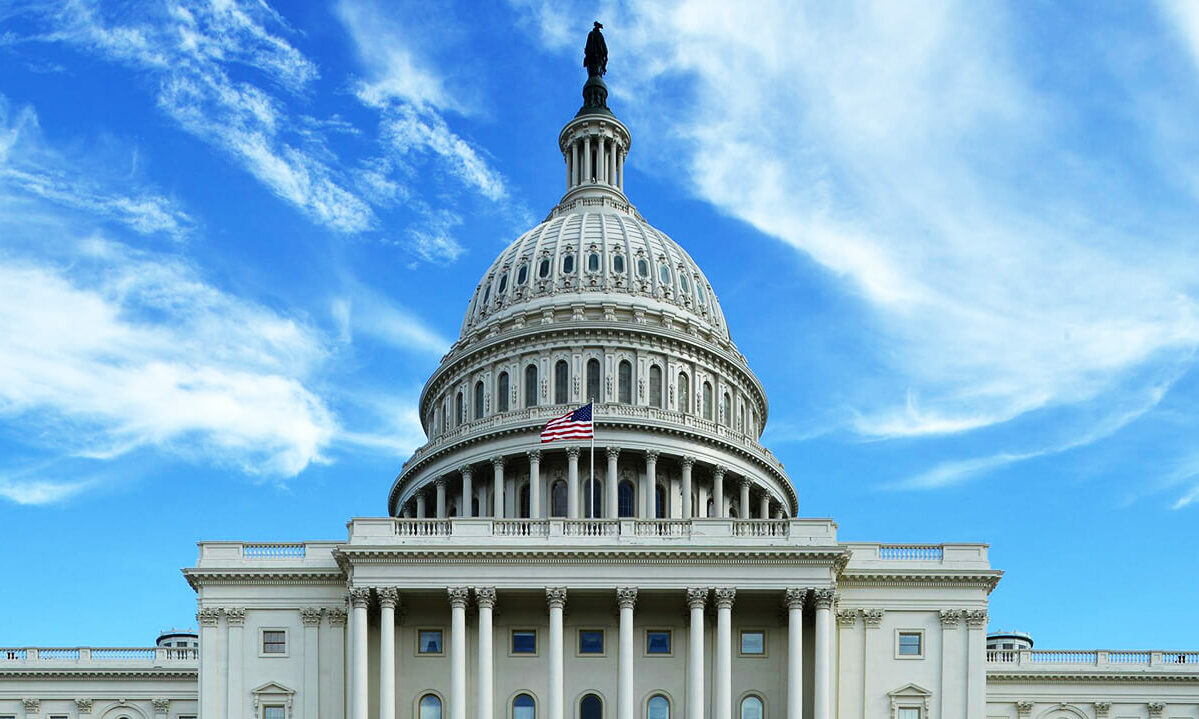
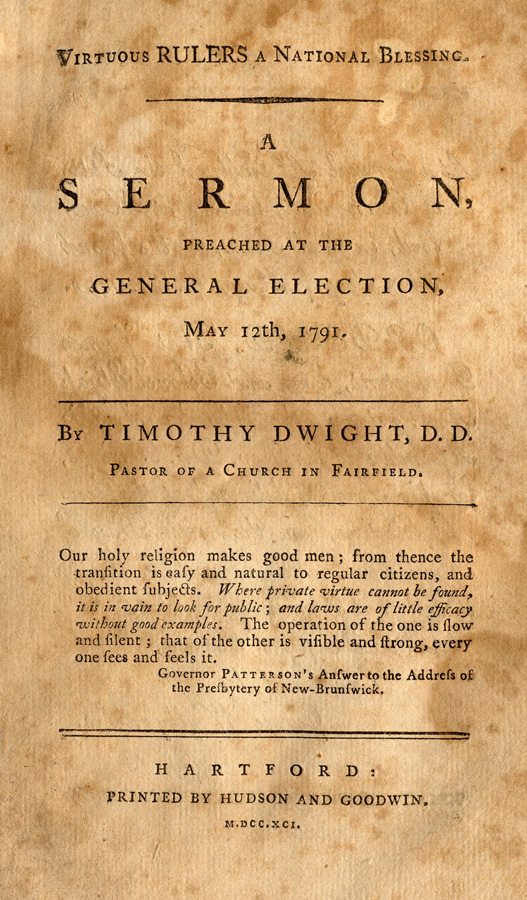

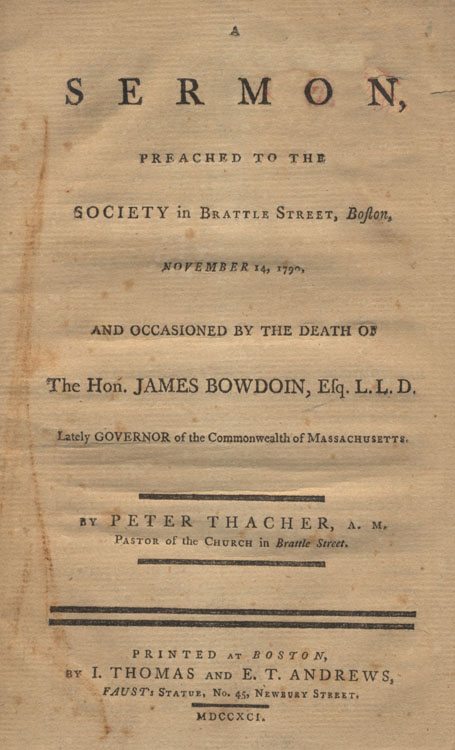
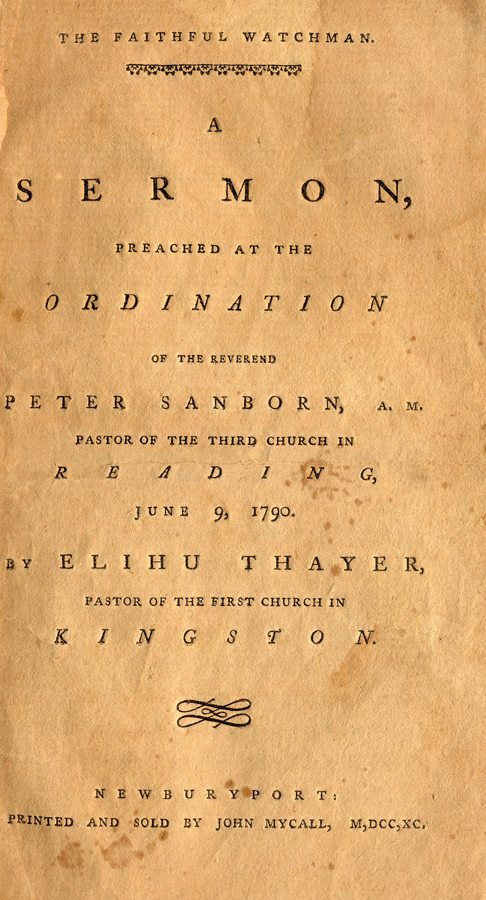
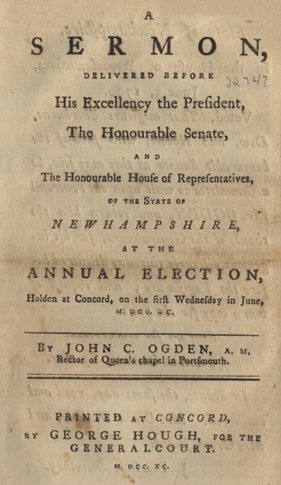

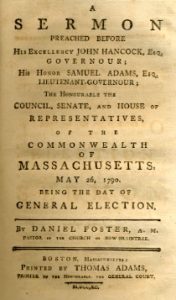 The Reverend Daniel Foster was born in 1750. He was ordained in 1788 (his father, the Rev. Isaac Foster, preached his ordination), and pastored a church in New Braintree, Massachusetts for many years. Daniel Foster had numerous sermons published, of which copies of five are know to be extant. In this election sermon, preached before Governor John Hancock, Lieutenant-Governor Samuel Adams, and both houses of the Massachusetts legislature, Rev. Foster provides an exemplary model of a pastor illuminating God’s governmental principles for the political leaders of his State. He lists the duties of magistrates as well as the duties of the people in a Christian country, and details God’s design for civil government.
The Reverend Daniel Foster was born in 1750. He was ordained in 1788 (his father, the Rev. Isaac Foster, preached his ordination), and pastored a church in New Braintree, Massachusetts for many years. Daniel Foster had numerous sermons published, of which copies of five are know to be extant. In this election sermon, preached before Governor John Hancock, Lieutenant-Governor Samuel Adams, and both houses of the Massachusetts legislature, Rev. Foster provides an exemplary model of a pastor illuminating God’s governmental principles for the political leaders of his State. He lists the duties of magistrates as well as the duties of the people in a Christian country, and details God’s design for civil government.